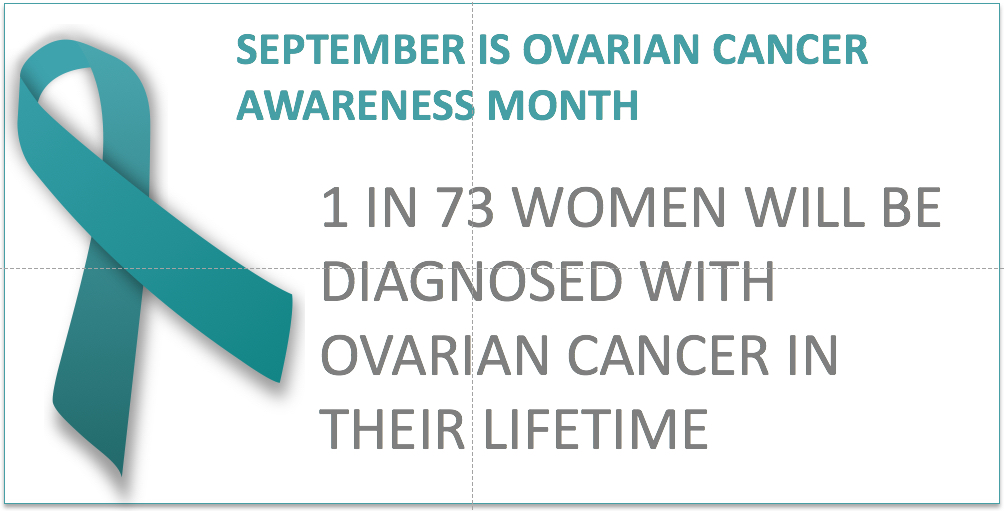Why is it so important to know the symptoms of ovarian cancer? Because there is no definitive test and ovarian is one of the most misdiagnosed cancers. Furthermore, with ovarian cancer, the chance of survival changes dramatically as the disease progresses. Here’s why-
To really understand this scenario, it’s necessary that you recall that high school anatomy class that caused the boys to giggle and the girls to blush: reproductive biology. We think of a woman’s pelvic region as sex organs: ovaries, uterus, vagina and their system of connecting tubes and arteries. But, tucked into the same space are the bladder, rectum, bowel and a pouch between the bladder and the uterus called the peritoneum.
Now, imagine that – for some unknown reason – one of your ovaries starts growing a tiny little tumor composed of microscopic buds of cancer. You may feel something . . . heavier menstrual bleeding, perhaps discomfort during sex . . . but the changes are subtle and easy to ignore, or perhaps there’s no physical change yet. Then, as the tumor gorges on the generous blood supply available to the reproductive organs, the growth becomes larger and larger and starts encroaching on its neighbors: the bowels, bladder, even the stomach. As pressure is applied to these organs, physical changes start creating problems with digestion. But the problem is not digestive at all.
About 75% of ovarian cancer cases are diagnosed in late stage. The astounding thing is that these are not women who ignored their bodies; they are generally women who pursued the wrong problem. How often, when you have a digestive problem, do you consult your gynecologist? When you experience unusually urgent or frequent urination, do you think it might be caused by your bladder being crowded out by a mass growing in the pelvic area? When you have changes in bowel habits, do you imagine that a tumor may be inhibiting the colon from moving normally? Or, for unusual bloating or pain of the abdomen, do you even consider that it’s gynecologic? For too many women and their primary care physicians, the answer was no.
Many women with ovarian cancer sought medical treatments for digestive problems for years, being misdiagnosed by several doctors until the cancer finally spread so rampantly that it could no longer be ignored. Some were told they were too young to have ovarian cancer and some that their symptoms were due to aging (menopause). One normally fit woman, after experiencing extreme bloating, consulted a plastic surgeon who performed an abdominoplasty (tummy tuck) but missed the cancer tumors and their fluid that caused the bloating.
The entire ovarian cancer community now agrees on a common set of symptoms that most women with ovarian cancer experience. They are pelvic pain, abdominal pain, bloating, urinary urgency or frequency, digestive problems such as feeling full too quickly, changes in bowel function. Some experience fatigue, unusual bleeding or pain with intercourse.
Our ovaries are notorious for creating growths or cysts and most are benign. However, 1 in 69 women will get ovarian cancer and only 15% of them will be diagnosed at stage 1, the most curable stage.
The Ovarian Cancer National Alliance and its partners in the ovarian cancer movement ask that, until there’s a test, every woman should know what is normal for her body. And, if she experiences these symptoms for more than a few weeks, she should see a gynecologist.
I recently met with a widower of a young woman lost to ovarian cancer. Yes, he said she had gastrointestinal problems for several years. It just didn’t seem that serious at the time. Now, he misses her terribly and lives with regret that he did not know the symptoms.





Add a Comment1 Comments
Excellent article Annette. With so many women consulting their physicians to diagnose our ailments, I am hoping physicians have a higher awareness of the symptoms of ovarian cancer. Women need to be aware of symptoms, however if their physician had this heightened awareness so many more women could be diagnosed at an earlier stage. With September designated as Ovarian Cancer Awareness Month, each physician may need reminded of the symptoms.
September 2, 2009 - 9:31amThis Comment